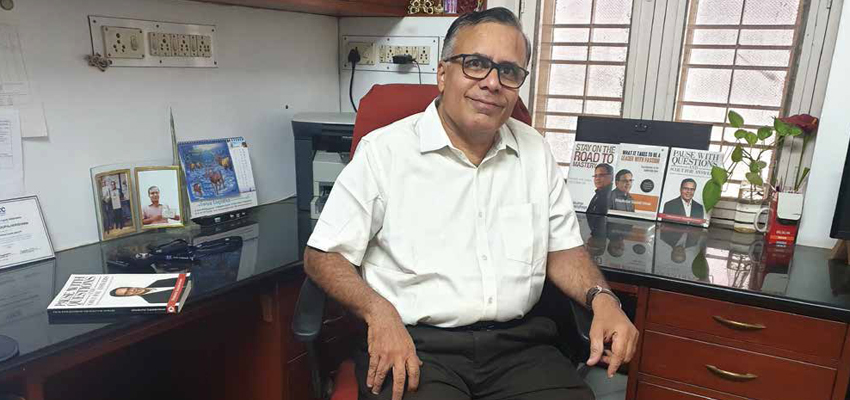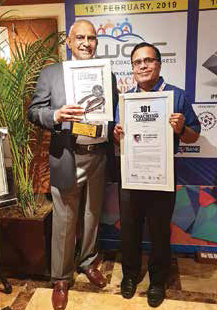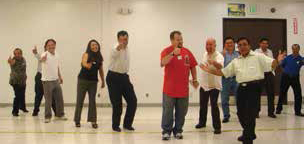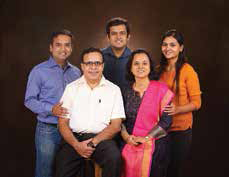Corporate Leadership is about Engaging Employees

For someone who toggled between ambitions to become an engineer, pursuing CA or ICWA or the ACS, he excelled in a totally different career path, carving a niche in the world of Management Consultancy. Udayakumar Gopalakrishnan, CEO, CORE MIND, shared his career-scape with Corporate Citizen. A career that traverses the age of hardcore Industrial Relations (IR) and Personnel Management (PM) to twin gradually with the dynamic concepts of HRM, Organisational Development and Management Consultancy across organisational setups, and straddling the scope of a highly digitised corporate environment. An excerpt
 With Ram (mentor coach) at
With Ram (mentor coach) atWorld HRD Congress
A Master Certified Coach (MCC), ICF, USA, Faculty – NTL Institute, USA and EQ Fellow and Certified Assessor (Six Seconds, USA), Udayakumar Gopalakrishnan’s penchant for constant learning and knowledge upgradation has stood him well in a career paved with risk-taking manoeuvres integrated with valuable experiences in Personnel Management and Industrial Relations. An alumnus of the prestigious XLRI (Jamshedpur), Udaykumar is a face to reckon within the areas of Thought Leadership, Organisational Development (OD) /Management Consultancy, as a Corporate Trainer and Facilitator and as a much sought-after keynote speaker. His knowledge and enterprise has been shared in three books authored by him-‘What It Takes To Be A Leader With Passion’, ‘Pause with Questions and Scout for Answers’ and ‘Stay on the Road to Mastery’
CC: What was the idea behind CORE MIND?
U Gopalakrishnan: I launched my dream venture CORE MIND in 1993. The singular mission was to render high-quality professional support by building leadership capabilities among those whom I trained or coached, thereby empower them and help them align with respective organisational transformation mission projects, in sync with core values, thus help leaders play a constructive role so that organisational cultures become more vibrant, engaging and conducive.
How have you integrated your past IR experiences into your current role as a corporate coach?
In the initial years, I was baptized by fire, doing the delicate balancing act between senior management teams and union office bearers. I believed in connecting at emotional levels, irrespective of background, qualifications, attitudes, knowledge, skills and experience. There were a few occasions when I feared for my life when unholy threats were issued at the factories, even late night/early morning calls from disgruntled/ dismissed employees, and pre-meditated gheroas. My self-confidence and support from peers, seniors, even union office bearers and workmen helped me navigate and turn around the situations. These elements have come in handy while training/facilitating participant groups of 25 or fewer to 300+ in a single setting.
What are your observations on transformations in HR management?
There have been an array of changes, some incremental, others volatile. Changes that are business driven are mandatory for survival and growth. Senior HR folk do have a big role to play in understanding and distinguishing between changes that are a sine qua non and those that are ornamental. But they have to necessarily factor in the human element and the emotional intelligence of individual leaders/employees.
‘Corporate leadership is about ensuring alignment and engagement of employees across levels, roles and locations by means of constant communication of vision, mission, values and beliefs’
 Along with participant group at USA
Along with participant group at USAYour take on HRM
Human Resource Management is a lot about acknowledging, recognising, empathising, connecting and elevating the quality of Human Resources – there can’t be a world without HR and beyond. The Human Resources function can accomplish and generate a difference among employees and leave a legacy while also achieving membership in the board.
What about new-age AI intervention in HRM?
Artificial Intelligence, Machine Learning and IoT, ought to be only enablers and not enforcers of driving business with the support of the employees and leaders, irrespective of levels and roles. I go back to what Jim Collins espouses in the classic book ‘Good to Great’ that technology can only be an accelerator and never a creator of momentum.
How do you define corporate leadership?
Corporate leadership is about ensuring alignment and engagement of employees across levels, roles and locations by means of constant communication of vision, mission, values and beliefs. It is also to do with respecting diversity in every form, furnish equal opportunities for employees to thrive and grow, act receptively on the constructive feedback and suggestions given by employees and ensure their voices, both spoken and unspoken, in the interests of the organisation and progress are heard.
What is the key to ensuring good corporate leadership?
Transparency is the key that ensures that corporate leadership is based on considerate, credible, authentic, and unbiased support across employees. The atmosphere of working within an organisation has to not only be conducive but also serve as a second home for employees.
‘Artificial Intelligence, Machine, Learning and IoT, ought to be only enablers and not enforcers of driving business. As Jim Collins espouses in the classic book ‘Good to Great,’ technology can only be an accelerator and never a creator of momentum’
 Family photo with Rita (wife),
Family photo with Rita (wife),Akshay and Akash (sons) and
Jyothi (daughter-in-law)
How do you define corporate mentorship?
Corporate mentorship goes beyond typical task-oriented leadership responsibilities. It calls for a tremendous commitment of the mentors at the senior management level to offer such initiatives. Especially, motivating mentors to invest quality time voluntarily, with no reward or return but devoted to make the organisation future-ready with apt engagement levels. Corporate mentorship is a great platform to engage, retain and grow talent.
What are the qualities of a good corporate mentor?
Mentors ideally drive organisational culture and employee engagement by promoting the culture of openness, growth and happiness, by instituting a robust process of permitting managers and leaders to multiply their clan, to ensure that second line leadership is always available and ready to step up into senior roles with felicity.
What will be the distinct impacts of Corporate Leadership and Mentorship in the coming years?
They will play an even more prominent role in the current times of data-driven work approaches. Corporate mentoring can promote healthy practices and development of employee resources, assuming even more significance in the wake of technology influx and metric-driven measures and outcomes. There are bound to be even bigger challenges to be addressed than now, as progressively with the advance of technology and informatics, there would be lesser emotional connectivity and interaction among employees.
How important is Learning and Development in today’s corporate culture, especially with the onslaught of widely available free knowledge?
Free knowledge is undoubtedly available, but then organising, structuring and designing appropriate direct forms of learning can never be substituted. Leaders and mentors ought to emphasise by not only stressing direct L&D modes for effectiveness but also surrender themselves to active learning, like how the legendary Jack Welch led the way by not only trained colleagues but also learnt from colleagues, at GE’s Training Centre, Croton Ville.
What is the future of corporate L&D and how big is this market?
Going by the trends, the market size is bound to only grow bigger. Institutions like Deloitte, E&Y, Harvard University and others constantly predict several variables of the future, projecting estimates not only in L&D and HR arenas but also in other facets of leadership and organisational working.
What are the qualities of a corporate coach? Can they be acquired?
There are neither easy routes nor short cuts for ‘becoming and being a skilful and value-driven Corporate Coach’. Some of the traits which corporate coaches have to necessarily acquire and practice are-reflective abilities, curiosity to learn, positivity in attitude, passion, intensity and willingness to make a difference in others. A few critical values they need to practice are-genuineness, transparency, respect for others, value diversity, humility, being objective, non-judgmental, authenticity, grounded in personal and leadership ethics and will to transform self, as he or she enables transformation in those coached. Active listening, the art of providing and receiving constructive feedback, optimism, applying the power of open-ended questions, direct communication, straight-talking and influencing are equally important. The Executive/Leadership Coach needs to possess a strong and seasoned life and professional experiences to be able to connect with client concerns.
Kindly share some tips for newbies in the field of Mentorship.
Do not tumble into the arena by accident, out of frustration to quit a job, or corporate life with diminishing returns. Do not imagine that it is simply fun to be in the space of interacting with professionals in the corporate world. There is no way to acquire this ability, except through consistent work on self and hard work, discipline, focus and through direct and indirect feedback processes. Finally, you need an element of humility to enable others to succeed.
What kept you motivated with your venture at CORE MIND?
Continuous engagement in learning by investing time and money to upgrade oneself with the latest methodologies and researches on offer by reputed leadership institutions across the world, professional networking by retaining reasonable connects with corporate clients, participant turned well-wisher, offering support to their development, co-learners and professional institutions like NHRDN, ISTD, NIPM, ISABS, MMA, ICF and the like.
How do you balance work-life?
I love watching cricket, tennis and football, listening to the good old melodious songs of the 70s and 80s [Malayalam, Tamil and Hindi]. Reading books [self-help and management], meditation and working on reasonable levels of fitness keeps my energy going. I love connecting metaphors from the sporting world to self-help, teamwork, management effectiveness and leadership strategies, to motivate corporate citizens.